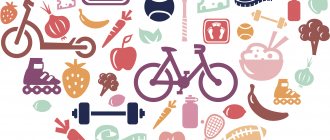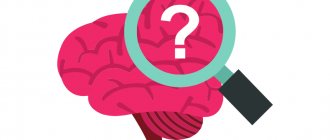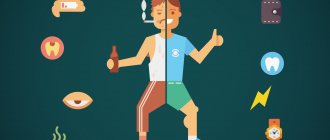- September 15, 2018
- Psychology of Personality
- Nastasya Krakhina
In everyday affairs, a person may not notice how he performs certain actions, so to speak, he lives on “automatic.” Often people, leaving the house, suddenly spontaneously remember: “Did I turn off the iron?” It also happens that, upon returning home after a hard day at work, doubts arise: “Did I lock the car?” The person then discovers that the action has been completed. Why is this happening?
Acquired behavior
From performing the same actions over and over again, a certain program is recorded in a person’s mind, which is “launched” when the appropriate situation arises. Simply put, people form habits through repeated repetition of certain techniques. It is this psychological phenomenon that will be discussed later in the article.
Below you can find out what habits are, how they are acquired and whether it is possible to get rid of them. And further it will be described in detail how to begin to change your life for the better by developing positive skills.
External links [edit]
| Look up habit in Wiktionary, the free dictionary. |
| Wikiquote has quotations related to: Habit |
- James Rowland Angell and Addison W. Moore. (1896) "Research of the Psychological Laboratory of the University of Chicago: 1. Reaction Time: A Study of Attention and Habit." Psychological Review
3, 245–258. - “Should habits or goals guide your life? It depends on the circumstances." (Scientific American MIND blog post)
- "Habit" . New Student Handbook. 1914
Definition of the term in psychology and description of the concept
From a scientific point of view, a habit is a repeatedly repeated action that does not require additional mental effort or reflection. This behavior tactic can affect any area of life. As a rule, all human habits are acquired.
Formation occurs through reinforcement and repetition. The first contributes to the second. Repetition is a behavioral manifestation. Thus, a habit is a response to the occurrence of a certain stimulus. The more often a person performs a particular action, the more strongly certain manners or desires are fixed in his mind. However, some habits can appear after a single occurrence. As a rule, this occurs when a person has experienced strong emotional involvement.
Having understood what a habit is, you should understand what they are. In general, they can be divided into two groups - good and bad. It’s worth taking a closer look at what they are.
a brief description of
An example of a professional habit is the action of a mechanic who wipes down his machine every day after work. In the domestic sphere, this means washing hands before eating. Social habits are a certain social structure that is accepted in a given society. However, they are a cultural norm. Individual habits, that is, those that belong to someone personally, serve as a certain reserve for social ones. They will change their category if they are noticed by society and are in demand in it. For example, business acumen and initiative were punishable in earlier times. Nowadays it has become very revered, entering the category of the social self. There are many examples of this. Thus, an enterprising person is considered a socially richer person.
Individual habits are conventionally divided into harmful and useful. Some people have harmful behavior patterns. They smoke and throw things all over the apartment, have dinner in front of the television screen and like to procrastinate. This is a broad topic. Bad habits are not beneficial from the standpoint of public good. They are harmful to the health of the person himself, and sometimes to those around him.
What is a good habit? This means, for example, going to bed on time, getting up early, caring for others and living with a feeling of love.
As a rule, habits appear at a certain period. However, a variety of such subconscious actions can also include various states or reactions that arise instantly.
What is a physical habit? This, for example, is the tendency to bite your nails or crack your fingers. An example of emotional automatic actions would be calling a young man, although consciousness tells him that this should not be done. Taking the same route to school or work is considered a behavioral habit.
Essential skills for life
Useful or correct skills are those that help improve human functioning. For example, leading a healthy lifestyle, rationally using work hours, giving up seats on public transport to older people are all good habits.
It is worth noting that some of them will be useful from the point of view of society, while others will be useful to the individual. However, many individual behaviors are part of social ones.
Good habits make an individual a better person. A striking example is maintaining an active lifestyle. If a person jogs every day, this will have a positive effect on his health. When he is accustomed to doing his job conscientiously, he increases his authority and makes a meaningful contribution to the development of his enterprise. In general, a good habit is something that helps a person develop and improves his life.
Why do you need to form good habits?
We are improving.
Harmful activities steal our time, money, emotions, while useful ones help us achieve our goals and improve our efficiency. To feel good, confident and energetic, you need to get used to useful actions.
We stop forcing ourselves.
Willpower is an effective way to force yourself to do something, but it requires effort. Every time we force ourselves to take some action, we unconsciously become upset and lose enthusiasm. But if the action is turned into a habitual thing, we will soon cross it off the list of “forced actions”.
The good triumphs over the bad.
It’s difficult to just stop eating at night - all your thoughts will be about the food in the refrigerator. And if you make a substitution, for example, drinking a cup of green tea with lemon before bed, then the ritual of filling the stomach will remain, but its meaning will change.
Take the self-esteem test
Bad habits
In contrast to useful skills, dependence is placed on something that carries negativity and largely destroys the individual as a person, resulting in his degradation. This means that bad habits are actions that can harm a person or even the society in which he is located. It is important to note that they prevent people from realizing themselves in life. Thus, bad habits always have a negative impact on a person. If they are widespread, they become dangerous for society as a whole.
Mind-blowing stories from the book Atomic Habits
The fortunes of the British Cycling Federation changed overnight in 2003.
The organization that governed all professional cycling in the UK hired Dave Brailsford as head coach. At that point, professional cycling in Great Britain had been mediocre for nearly a century. After 1908, British cyclists won just one gold medal at the Olympic Games, and performed even worse at cycling's biggest race, the Tour de France. For 110 years, no British cyclist has won this competition. In fact, the results of British cyclists were so disappointing that one of the largest bicycle manufacturers in Europe refused to sell its products to the British team because it feared a drop in sales: other professional cyclists might believe that the British team's failures were due to the quality of the bikes.Brailsford was tasked with taking British cycling to the next level. His main difference from previous coaches was his unwavering commitment to a strategy he called "maximizing"; This strategy was based on the philosophy of looking for opportunities for minimal improvement in everything you do. Brailsford said: “The whole principle was born from the following idea: if you fell and all your worries about it help to improve the quality of your cycling by even 1%, then adding up the effect of all the falls, you will achieve quite significant improvements.”
Brailsford and his team started with small changes that would help the team move closer to the status of a professional team. They redesigned bicycle saddles to make them more comfortable and began rubbing alcohol into tires to improve traction. They asked cyclists to wear electrically heated jackets to ensure their muscles were at the ideal temperature while riding, and used biological sensors to track how each athlete responded to each challenge. The team tested different fabrics in a wind tunnel and concluded that it made sense to replace suits for outdoor racing with suits for indoor cycling because they are lighter and have a more streamlined shape.
But they didn't stop there. Brailsford and his team continued to look for options to improve at least 1% in all areas that had previously been ignored or seemed to have little prospects for improvement. They tested different types of massage gels to see which one restored muscles faster. They hired a doctor who taught each athlete how to properly wash their hands to avoid respiratory viral diseases. They selected the optimal type of mattress and pillow for each athlete to ensure a good night's rest. They even painted the inside of the team's truck white; this made it possible to identify the smallest particles of dirt that would normally go unnoticed, but could adversely affect the operation of a perfectly tuned bicycle mechanism. When this and hundreds of other minor improvements were implemented, the results were immediate.
Just five years after Brailsford's appointment, the British team dominated the road and track races at the 2008 Beijing Olympics, where athletes, to everyone's surprise, won 60% of the gold medals. Four years later, at the London Olympics, the British did even better, setting nine Olympic and seven world records.
That same year, Bradley Wiggins became the first British cyclist to win the Tour de France. A year later, his teammate Chris Froome also won the race, and then built on his success with a string of victories in 2015, 2021 and 2021, taking the team to five Tour de France victories in six years!
Over the course of 10 years from 2007 to 2021, British cyclists won 178 world championship victories, won sixty-six Olympic and Paralympic gold medals and won the Tour de France five times; this success is the most significant in the history of cycling.
List of negative habits
The most harmful habits of people are the following:
- Profanity. The habit of uncultured expression has haunted many since childhood. It often leads to the fact that a person cannot correctly express his thoughts without using obscene words, which leads to degradation.
- Excessive caffeine consumption. Addiction to such drinks is a habit of most people. However, excessive consumption of a substance such as caffeine disrupts brain function and negatively affects the entire body.
- Constant lack of sleep. During sleep, important processes occur that allow the body to replenish the lack of strength. Neglect of this point leads to various physiological and psychological problems.
- Diets for weight loss. Often, in pursuit of slimness, many exhaust themselves with various diets (you should not take into account the diets prescribed by the doctor during treatment). Nutritional balance plays an important role in the normal state of the body.
- Frequently spending time at the computer and on social networks. Gadget addiction is one of the most common in the whole world and has a detrimental effect on the psychological component of people. Speaking about frequent spending time at the computer due to work, it should be noted that this leads to negative consequences regarding the functioning of the cervical and lumbar spine and many other physiological disorders.
- Smoking. Quite a lot is said about the dangers of tobacco, but this does not reduce the number of people who use this drug. This addiction is the cause of many diseases and disorders in the body.
- Frequent use of medications. People often mindlessly take various medications. Many people have gotten into the habit of taking medications even when they could do without it.
- Alcohol and drugs. Just like smoking, habits are destructive to the body and stupefying the human mind.
- Binge eating. The habit of eating problems or snacking even when there is no feeling of hunger has consumed the whole world. However, excessive consumption of any food is a habit that negatively affects both the figure and the human psyche.
The process of habit formation in children
Many habits are formed in childhood. A child, like a sponge, absorbs what he sees around him and always tries to imitate adults. Therefore, the environment plays an extremely important role at the moment of personality formation.
A fragile psyche is not able to reject bad habits. During this period, children often acquire things that they will not need in later life. It is extremely important for parents to monitor not only their child’s habits, but also pay attention to their own behavior.
See also[edit]
- Behavioral addiction
- Fixation (psychology)
- Habitus (disambiguation)
- Self-control
- Tetris effect
- Vice
- Perseverance (virtue)
Approaches to Changing Habits
- Behavior modification
- Cognitive behavioral therapy
- Habit change training
- Paradoxical intention
Behavior with familiar elements
- Childhood obesity
- Nail biting
- Neurodermatitis
- Nose picking
- Obsessive-compulsive disorder
- Procrastination
- Thumb sucking
- Bulimia
The process of habit formation in adults
Adults are able to consciously adjust their habits, unlike children. They are most easily formed through positive emotions associated with a certain action, or when a person is strongly motivated by something.
However, bad habits, surprisingly, are easier to form than good ones. British scientists have found that it takes 66 days to get used to performing an action that will be beneficial. This can be explained by the fact that, as a rule, bad habits cause more pleasure in a person. Wanting to get a dose of pleasant sensations, the psyche and body are rebuilt, and the formation process occurs faster. Therefore, people often break down when trying to quit smoking, start waking up earlier than usual, or run in the morning.
Formation conditions
In order for a person to develop a habit, the first thing you need to do is attract attention, “hook” him, and then interest him. This creates confidence and a feeling that he can do it. It is worth remembering that weaning a person from addictions is considered an unpromising activity. The task in this case should be formulated differently. This should not be a fight against bad skills, but the development of new, useful ones.
A person must understand the meaning of a useful habit. At the same time, new automatic actions should fit well into his lifestyle, and also be supported by loved ones. If a person is attentive to himself, he will not allow him to develop bad habits.
How to get rid of the habit?
Having understood how behavioral skills are formed, you should figure out how you can get rid of them. It is worth noting that, as a rule, people want to eliminate something bad from their lives.
Therefore, psychologists recommend following the following algorithm of actions, which will help in getting rid of destructive habits:
- Accept the fact of the existence of a bad habit and understand what bad it brings.
- Imagine positive results from future achievements. Thus, understand how pleasant it will be to feel the fact of getting rid of an ingrained bad habit.
- Start to control your actions. And in case of failure, do not stop and record your failures (you can write them down in a notebook, trying to evaluate yourself and understand why this happened).
- Work on yourself in the right direction for at least 3 weeks. Depending on how deep the habit is, the process of breaking it can take up to 10 weeks. Regular self-control is a successful way to improve your life.
In addition, psychologists recommend rewarding yourself for successful progress towards your goal. For example, a person decided to quit smoking. He can promise himself that if he lasts 7 days without cigarettes, he will allow himself to buy what he has long dreamed of, go on vacation, etc.
The benefits and harms of habits
The benefits of habits are obvious. If we constantly had to deal with something new, our consciousness would not be able to withstand such a load. Therefore, it is definitely useful and hardly requires revision to the habit of turning off the light when leaving the room, washing your hands after visiting the toilet, or doing ten squats every day. But you need to take a closer look at some of your habits.
We will talk about seemingly completely harmless customs that do not harm anyone: going to work the same way, visiting the same stores, watching TV series on weekends.
By getting used to it, we become predictable and do not develop. A fear of change appears, and a person refuses it, even to the detriment of his interests. He may remain in an unpromising job with a tyrant boss until the end simply because he is used to it and is afraid to change something. And the helpful brain will come up with a thousand reasons to leave everything as it is.
People are manipulated using their habits. This tactic is especially often used in sales. For example, when a store opens, customers are lured with low prices, a profitable bonus system or gifts. After people get used to visiting a retail outlet, prices gradually increase, and bonuses become not so profitable. Of course, some consumers will see through the trick and leave to look for other places, but some will remain as regular customers.
You can't become a slave to your habits! You should learn to use them for your benefit and make those things automatic that are not worth the extra effort. And you should get rid of useless restrictions that hinder development, replacing them with good ones.
How to change your life for the better thanks to the right habits?
Habits shape a person's personality. Someone gets up early and goes for a run, thereby benefiting themselves and their body, someone neatly folds things, so their house is always in order. But a person of a different mindset is accustomed to throwing garbage on the street, thereby harming the environment. These are all examples of negative traditions. But how can you make sure that your habits improve your life rather than destroy it? Let's look at another list.
The following are some of the habits of successful people:
- Investing in personal development.
- Curiosity.
- Communication with people who have achieved success.
- The ability to take responsibility for your losses and failures.
- You need to spend every day with benefit (even your day off).
- The ability to help others.
- Healthy eating and active lifestyle.
By instilling these habits in yourself, you can change for the better. This will help you achieve success, become kinder and richer.
Meaning in human life
Today is characterized by frantic rhythms and endless cycles of events. In order for a modern person to adapt to the ever-increasing dynamics of everyday life, habits are needed. Only lazy people have not tried to somehow control their automatic actions. Man is biosocial. And the social component has a great influence on what skills and habits he develops. If there is a need to adapt to the environment, then the mind will find how to do it. Thus, a new habit appears. In other words, surrounding circumstances dictate certain conditions of behavior and force the development of automatic skills.
What is a habit in a person's life? This is one of the most important characteristics of his personality. And there is an explanation for this. Habits make up character, which in turn influences destiny. Automatic actions that are performed by a person at the subconscious level can be both his friends and enemies. That is why everyone should monitor their habits very carefully. The bad ones, unfortunately, stick themselves. Good ones appear only under certain conditions.










